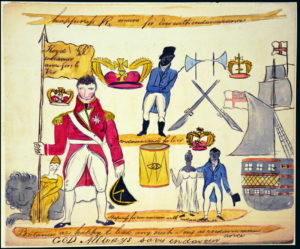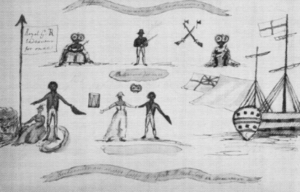Teaser Tuesday: Bussa’s Rebellion
Can you believe we’re down to less than a month until The Summer Country appears in stores?
Once the book is out, I’m going to be posting the amazing book club guide the folks at William Morrow and I put together. (The reason I’m not posting it now is that the discussion questions are absolutely riddled with spoilers. So don’t look at the guide before you read the book! Just saying.) But there were so many pictures and topics that couldn’t make it into the guide, for length reasons among other things.
So….
One of the major real events that inspired The Summer Country is Bussa’s Rebellion, a rising of enslaved people that took place in 1816. There are all sorts of debates about why this happened when it did, who was actually involved (there was actually a Bussa, but how central a role he played is up for debate), and so on, but what we do know is that on Easter Sunday, 1816, the cane began going up in flames in the parish of St. Philip, rapidly spreading across Christ Church, St. George, St. Thomas, and St. Michael as a carefully coordinated battle plan went into action.
We also have descriptions of the flags that were carried into battle– and they’re fascinating.

The legend on the flag (it’s too squinchy to read in this picture, I know) is “Britannier are always happy to assist all such sons as endeavour.”
One of the rumors circulating was that the king in England (or possibly the queen, who is depicted in the flag below as being of African descent) had decreed the freeing of the slaves, but the planters were deliberately blocking the royal edict. As one of the participants testified afterwards, a friend had told him that the enslaved people “were all to be free –that the Queen and Mr Wilberforce had sent out to have them all freed, but that the Inhabitants of the Island were against it; that he had been at Cox-hall, and had seen it in the Newspapers; and that it was a great shame they were not all freed, and that they must fight for it.”
The flag pictured above depicts English ships and English soldiers coming to the aid of the enslaved community, shown here as respectable middle class citizens in elegant contemporary garb.
Along the same lines, another flag (below) reads “Wilberforce Forever”, and also depicts English ships sailing to help.

Want to learn more about Bussa’s Rebellion or the flags involved? Check out Steven Knowlton’s article on Flags of New World Slave Risings or Lillian McNaught’s thesis on Bussa’s Rebellion.
There is so much more to tell about Bussa’s Rebellion– and all the other historical events depicted in The Summer Country! So I’ll be back here next Tuesday with some more pictures and more stories.
To read an excerpt from The Summer Country, just click here!
Wow! I just finished a book that starts in Barbados in 1830, Washington Black, and no mention is made of this rebellion, perhaps be cause the narrator was too young to know about it.